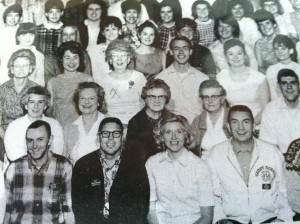I spent part of the spring and early summer doing a little physical therapy because lately my elbows and right shoulder have been bothering me when I climb. So once every two weeks I’d make my way to see a man who I consider to be a genius when it comes to helping people heal and maximize the capacity of the their body. It turns out that his assistant attends the church I lead, and so we ended up having all kinds of brief discussions during my visits about school, literature, calling, vocation, the mountains, and more.
My last visit led to a conversation about a mission trip she’d made to Central America, and a discussion of how vast the needs are down there for physical therapy. You see, the stakes are so much higher there. They’re not trying to sustain an esoteric hobby into their senior years like I am – they need PT so that they can do their jobs. And then she said something that, of all the thousands of conversations I’ve had this summer, has stuck with me perhaps more than any other phrase. She said, “they’re better at living with pain than we are”. She walked away to see another patient as electrical impulses began stimulating my shoulder and elbow. I tried to check my e-mail while sitting there, but her comment had pierced me Better at living with pain.
Later in the summer, I had a brief conversation with someone who was helping us move our piano from the living room to the bedroom because we were getting our floors refinished, and though I can’t remember the exact words, he was questioning our western obsessions with retirement, security, and the pursuit of “the good life”. His words also struck a chord.
The very next day, I hopped on a float plane to go speak on an island for a week, and since the subject was the minor prophets, a single phrase in Zechariah 8:9 (“let your hands be strong”) served to bring the summer’s two powerful phrases together and force the question: What exactly does it mean to be strong?
Though the answer is surely worthy of more than a blog post, I’d suggest that it’s critical for us in the west to deconstruct our notions of strength, clearing the deck so that we can think more like Christ followers, and less like people insulated from the ravages of the fall that affect the vast majority in our world. Strength, in other words, isn’t really about machismo – climbing into your sixties or seventies, running marathons, doing cross fit. Those aren’t inconsequential or meaningless, and they’re perhaps a form of strength (for another post sometime) but when Zechariah says “let your hands be strong”, he’s speaking of something different. I know these because just a few paragraphs earlier in his writings, the Lord says that the mountains will become a plain, “not by might, nor by power, but by my spirit”.
In other words, there’s a strength available to us in Christ that’s independent of bench pressing, or machismo:
Strong enough to confess, or forgive, to say the hard thing or hear it.
Strong enough to serve others even when you’re in the midst of your own deep valley.
Strong enough to rejoice and get on with what needs to be done, even if you’re in pain.
Strong enough to be grateful, joyful, and persevere through trials with grace.
Strong enough to open live with the intention of being a blessing to others.
Strong enough, yes, even to lay down your life.
These strengths are seen at the best when the strength of Christ is free to shine through us, and here’s the kicker: Jesus tells us that His strength is made perfect right in the midst of our weakness, and this leaves me wondering if our obsessions towards a weakness free, and suffering free life, aren’t in fact making us weak.
Perhaps this explains why the hearts of joy, generosity, forgiveness, and servant hearts in Rwanda seem so to be much stronger than my own. Helmet Theilicke said that one of the major problems in the western church is that we have an inadequate view of suffering. I’m beginning to understand what he means, especially when our attempts to avoid all personal suffering create a sense of withdrawal from joy, service, and so much more as we tell ourselves, “as soon as I fix this, I’ll get back to serving and rejoicing”. The trouble is that in this fallen world, tendonitis goes away, and then it’s allergy season. After that there’s a ski injury, 0r worse, a real disease, and we’re back on the bench, out of God’s story.
No – we’re in God’s story today, or should be – right in the midst of our weaknesses. That’s why Paul said that he’d learned to glory in his weakness rather than obsess about fixing it. “For when I am weak, then I am strong” is whathe said, and I think that many of us in the West will spend the rest of our lives trying to fully understand what he meant, and live into the reality of it.
I welcome your thoughts…











